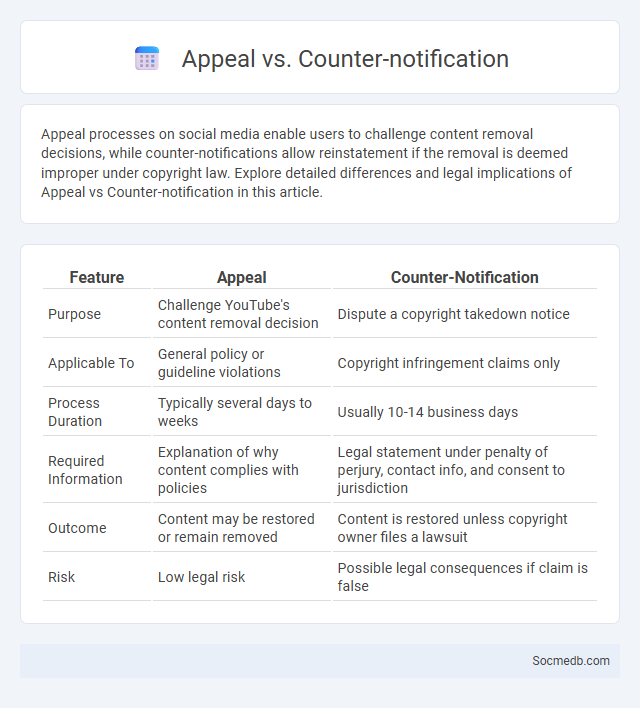
Photo illustration: Appeal vs Counter-notification
Appeal processes on social media enable users to challenge content removal decisions, while counter-notifications allow reinstatement if the removal is deemed improper under copyright law. Explore detailed differences and legal implications of Appeal vs Counter-notification in this article.
Table of Comparison
| Feature | Appeal | Counter-Notification |
|---|---|---|
| Purpose | Challenge YouTube's content removal decision | Dispute a copyright takedown notice |
| Applicable To | General policy or guideline violations | Copyright infringement claims only |
| Process Duration | Typically several days to weeks | Usually 10-14 business days |
| Required Information | Explanation of why content complies with policies | Legal statement under penalty of perjury, contact info, and consent to jurisdiction |
| Outcome | Content may be restored or remain removed | Content is restored unless copyright owner files a lawsuit |
| Risk | Low legal risk | Possible legal consequences if claim is false |
Introduction to Content Dispute Mechanisms
Content dispute mechanisms on social media platforms are designed to address conflicts related to user-generated content, including misinformation, copyright claims, and harassment. These mechanisms typically involve flagging systems, automated reviews, and human moderators to evaluate and resolve disputes efficiently. Effective content dispute frameworks enhance platform trust, ensure compliance with legal standards, and protect user rights by maintaining community guidelines transparency.
Understanding the Appeal Process
Understanding the social media appeal process is crucial for resolving content disputes or account suspensions efficiently. Your appeal must clearly outline the reasons why the initial decision should be reconsidered, providing supporting evidence or context for the review team. Knowing platform-specific guidelines and timelines enhances your chances of a successful appeal and restores account functionality quickly.
What is a Counter-Notification?
A counter-notification is a legal response submitted by an individual or entity claiming their content was wrongly removed from a social media platform due to a copyright infringement notice. It initiates a formal process where the original complaint is reviewed, potentially restoring the disputed content if the counter-notification is validated. This mechanism is essential in protecting users' rights and ensuring fair content moderation on platforms like Facebook, Instagram, and Twitter.
Overview of the Strike System
The strike system on social media platforms enforces community guidelines by issuing warnings or penalties when users violate rules, such as posting inappropriate content or engaging in harassment. Each strike accumulates over time and can lead to temporary suspensions, reduced features, or permanent account bans, ensuring safer online environments. You should understand the specific strike policies of each platform to effectively manage your online presence and avoid penalties.
Key Differences: Appeal vs Counter-Notification
Appeal in social media involves requesting a platform to review and reverse a decision or content removal, often used when you believe your content was wrongly flagged. Counter-notification is a formal legal request submitted after a content takedown, asserting your rightful ownership and asking for content reinstatement under copyright laws. Understanding the distinct purposes of appeal and counter-notification is essential for effectively managing your content rights and responses.
How to Initiate an Appeal
To initiate an appeal on social media, carefully review the platform's community guidelines and identify the specific reason for your content removal or account suspension. Gather relevant evidence, such as screenshots or account activity, to support your case and clearly explain why you believe the decision was incorrect. Submit your appeal through the official channels provided by the platform, ensuring your message is concise and respectful to increase the chances of a favorable outcome.
Steps to Submit a Counter-Notification
To submit a counter-notification on social media, start by identifying the specific platform's copyright complaint process, usually found in the Help Center or legal section. You must provide your contact information, a detailed description of the removed content, and a statement under penalty of perjury that you have a good faith belief the content was wrongly removed. Ensure you include your electronic signature, and keep copies of all correspondence to protect your rights throughout the dispute resolution.
Consequences of Strikes on Your Account
Strikes on your social media account can result in restricted features, reduced visibility, and potential suspension or permanent ban, impacting your ability to reach and engage with your audience. Platforms like YouTube, Instagram, and Facebook enforce strict policies to maintain community standards, making strikes a clear warning of violations. Maintaining consistent compliance with guidelines protects your account's reputation and ensures uninterrupted content sharing.
Best Practices to Avoid Strikes
Maintaining compliance with platform guidelines requires understanding each site's content policies to avoid strikes on social media accounts. Consistently reviewing community standards and using copyright-free or properly licensed materials significantly reduces the risk of violations. Engaging actively with platform tools like content ID systems and dispute processes helps promptly address potential infringements.
Final Thoughts: Choosing the Right Action
Selecting the right action on social media requires understanding your target audience and aligning your content with platform algorithms to maximize engagement. Your strategy should prioritize consistent posting schedules, authentic interactions, and data-driven adjustments to improve reach and influence. Focusing on these elements ensures your social media efforts drive meaningful results and foster lasting connections.
 socmedb.com
socmedb.com